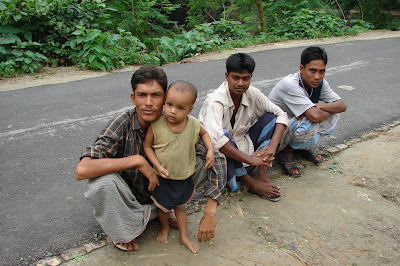What is “poverty”? During my stay in Bangladesh the definition of poverty was a question I had constantly in my mind.
Why is the definition of Poverty is important? Well I believe that, at least, a good understanding of it is important for the definition of who we call “poor people” and how we can contribute to alleviate “poverty”.

I believe that the concept of poverty arisen with the creation of the modern society. Where it arises the responsibility of the government/State towards the citizens, concerning several aspects like health, education and even society integration.
This concept has been globalized specially, after the Second World War, with the decolonization process and with the creation of the global organizations (EX: UN, World Bank, WTO). Creating the sense that poverty is a “world” responsibility. These organizations are the regulators and the higher entities of a world order. Concerning the poverty, all of them have a huge impact but only some take a full responsibility like the UN.
I believe, that nowadays, the definition of poverty is a global definition in a world leaded by economy, markets and interests. Today, when we think about poverty we think… People that live with less then 1 or 2 dollars per day. And we think “Incredible!!!”
But what does this mean? Are they really poor? Maybe not, maybe yes, but that doesn’t really matter. Because the concept, in a global perspective, is an external concept! This means, it categorizes people that match certain economic indicators as being… Poor.

- Ohhhh… so this means that globalization creates the concept of poverty… So we should just avoid or fight against globalization.
- The reality is that you just can’t avoid it. And because globalization creates the concept of poverty it does not mean that “problems” weren’t there before. Because poverty is a consequence of the creation of wealth. For example when you draw a circle you have a space in the circle, outside the circle and over the border you have drawn. But mainly in and out like rich and poor… and the border is the globalization! Is it confusing?

Poverty and Globalization
The creation of the concept of poverty is deeply related to the creation of a globalization that, since the early 90s, takes only the form of markets. This means that the capitalism revolutionizes the world, changing secular social structures, aiming the creation of markets. There is no space for self-sustainable communities, or “closed” countries. This is not bad or good is just a fact that creates “poverty”.
In this new order of the world the creation of the concept of poverty ignores all the different “poverties” that exist. For example: a homeless/beggar, in Dhaka is more or less poor than a man that lives in the countryside that has never seen money in his life? The answer is a cultural answer, in Bangladesh it depends on their social network. So it is not an economic answer that sees them as the same, “poor man”.
So, the consequences are that when the UN or other development organizations fund NGOs in a country like Bangladesh, they are creating changes in the structures with:
a. NGOs that create the concept of poverty – as populations realize they are poor.
b. NGOs are being agents of the creation of markets introducing money as an intermediate (Ex: Micro credit)
c. The local communities social structures change.
d. Creates a middle class in the communities – People that own and work at the NGOs
e. The NGOs usually reproduce a perspective of development of the “center” and ignore the local community specificities.
On the other hand, NGOs substitute the local government as representants of the local populations. They also develop programs in several areas like education, sanitation, women empowerment or health considering the Millennium Development Goals. These programs usually show a light but also a unidirectional way towards a standardized world designed in the offices in Geneva or New York.

What to do and conclusion!
I don’t want to generalize but I believe there is a need to reeunderstand the NGOs role in development and that can only be done with a closest link to academic Universities around the world and NGOs that can help rethinking the concept of development and poverty.

So, global poverty is a big word to represent a multiplicity of real situations of exclusion, lack of social integration, dependency, hunger etc. The economic indicators can be misguiding or erroneous conducting to a standardized approach of the world poverty, but they are enforcers of the creation of global markets and the continuation of dependencies towards global centers. On the other hand their non existence create countries or regions “excluded” from the Globalized world, that means that there will be no foreign Investment in the future, cycles of economic depression and probably political tensions and great places for weapon sellers to enforce their power. Being the armament industry one of the axes of global economy.
Confused? I am!















